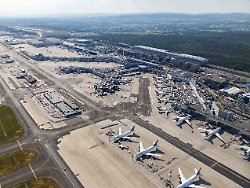Small and medium-sized airports in particular are facing financial problems in the pandemic, says the aviation industry association. Therefore, the federal government should help out with billions. Critics call for the support to be linked to environmental requirements.
Immediately before the planned air traffic summit of the federal government, the industry demanded further billions in aid from the federal government. After the airlines, the airports and the federally owned German air traffic control would now have to be refurbished with taxpayers' money, demand representatives of industry associations who are taking part in the meeting scheduled for Friday in Berlin. In addition, prospects for pandemic-safe air traffic must be created. There is resistance from environmentalists to the rescue package advocated by Federal Transport Minister Andreas Scheuer.
"It must not come to irreparable structural breaks," said the general manager of the industry association BDL, Matthias von Randow. "With the second de facto lockdown, we are facing job cuts. Of around 260,000 jobs at German airlines and airports alone, around 60,000 are acutely threatened." The companies would have to go into massive debt because of the slump in demand. That weakens the strength for investments, for example for digitization or for more economical new aircraft.
Politicians have to reimburse the airports as an "important sign and first step" for the costs incurred in the first lockdown by keeping the infrastructure open, said Ralph Beisel from the airport association ADV. These reserve costs amount to the sum of 740 million euros, which would primarily benefit small and medium-sized airports. Then it would have to be considered how the airports could be permanently relieved of sovereign costs that would be paid by the state in other European countries.
The deliberations will also focus on the involvement of the federal states, which often jointly own the airport operators with neighboring communities. Lower Saxony, for example, supports the Scheuer-Plan to reimburse the storage costs and suggests help for Hanover Airport.
"Instead of airports, invest in the environment"
Another topic is the federally owned Deutsche Flugsicherung GmbH, which could run into liquidity problems due to the fee losses. DFS boss Klaus-Dieter Scheurle had put the loss of sales by 2025 at up to two billion euros. Despite a new promissory note loan of over 500 million euros and cost-cutting measures, the company still needs help, which the BDL has put at 1.2 billion euros. Here the federal government has to step in as the owner: "Otherwise unrealistically high fees would have to be levied when the air traffic was restarted, which the airlines could not manage," said von Randow.
"We have to find a way forward in order to be able to offer safe flying again", the Frankfurt airport manager Stefan Schulte had demanded when presenting the deep red business figures for the third quarter. He called for a rapid test strategy, which also requires bilateral agreements with the USA. The BDL also advocates that when assessing risk countries, the incidence figures should not be considered alone.
As a second criterion, the number of actually infected people entering from the respective countries of origin should be included. "According to the data available in the meantime, the importation risk is concentrated in a very small number of countries – and these are not the traditional holiday destinations," said von Randow. Outdated structures should not be supported with billions in aid, however, believes the ecologically oriented traffic club VCD.
"Instead of expanding airports further and sinking additional funds into regional airports that were unprofitable before the pandemic, we need a socially responsible restructuring in the direction of the environmental association," comments VCD President Kerstin Haarmann. New unconditional aid like at Lufthansa should no longer be given, but it should be linked to climate protection. The Greens MPs Sven-Christian Kindler and Daniela Wagner have a similar view. "Companies that the state is helping in this crisis must meet clear climate requirements and have a sustainable business model that is compatible with the Paris Climate Agreement. This is not the case at many regional airports."
.
